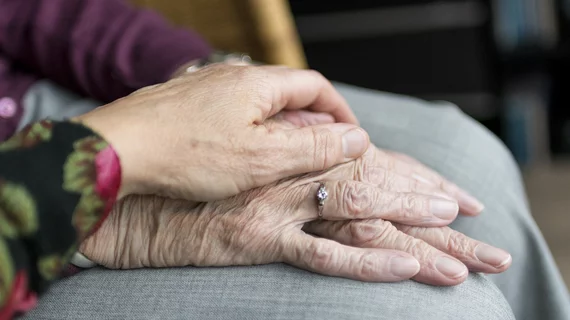Opportunities galore for those who would build Alzheimer’s caregivers a better app
The field of mHealth applications to assist nonprofessional caregivers of Alzheimer’s patients is thin, weak and in need of innovators, according to research published Sept. 7 in NPJ Digital Medicine.
The authors of the study, a literature scoping review conducted at Western University of Health Sciences in Pomona, Calif., call on developers of mHealth technologies across industry, government and academia to take notice—and consider the lack an opportunity.
“Very few applications are available to assist Alzheimer’s disease caregivers,” state lead author Eunhee Kim, PharmD, senior author Don Roosan, PharmD, PhD, and colleagues.
Noting that the National Institute on Aging is currently funding some 84 trials supporting Alzheimer’s caregivers, the team says its perusal of 12 representative mHealth studies revealed a lack of comprehensive caregiver support in available technologies.
Equally glaring for their absence were “functionalities for early Alzheimer’s disease diagnosis and the integration of caregivers in the patient’s care management.”
The authors describe six application functionalities common within the field—tracking, task management, monitoring, caregiver mental support, education and caregiver communications.
The latter three were the scarcest in the literature review, suggesting they’re also the most in need of development:
Caregiver mental support. Kim and colleagues found only one application that supplies mental health support for caregivers, doing so with a self-assessment tool for depression and burden.
“The study, however, did not specify what valid measures to assess depression were used,” the team reports. “Understanding the state of one’s mental health and the amount of burden can accurately prompt the caregiver to seek medical attention if needed.”
Education. Just three of the 12 applications include any sort of instructional component.
“The core of caregiving lies in understanding the disease and knowing how the patients will change through the disease progression,” the authors write. “With proper and accessible diagnosis tools, caregivers, often one of the closest people to the patients, can identify alerting factors that aid the early detection of Alzheimer’s disease.”
Caregiver communications. Only two apps had a communication platform. One features a social network component facilitating information and opinion exchanges among and between Alzheimer’s caregivers. The other has a secure platform enabling caregivers to send tracking info directly to the patient’s physicians.
Future applications might “adopt a similar platform to expand the caregiver community and network of support for caregivers,” Kim and co-authors write.
More:
Caregivers for AD patients often endure an enormous financial, emotional and physical burden. According to a recent study, 69% of caregivers of Alzheimer’s patients felt a medium burden and the patient’s severity of the disease state was a factor significantly affecting them. When compared with non-caregivers, caregivers were more likely to be depressed and also utilized more negative than positive coping strategies. Giving support to caregivers is as important as providing direct care to Alzheimer’s patients because the well-being of caregivers is a direct indicator of the care quality they provide.”
The study is available in full for free.

